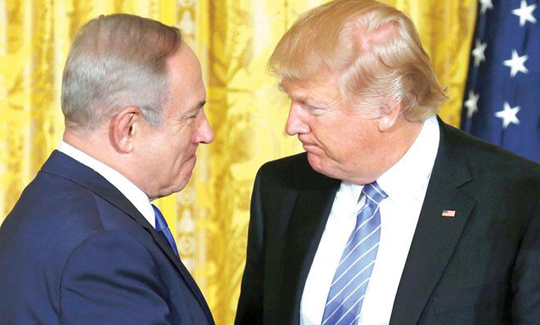Washington, Feb 16: US President Donald Trump broke with his last three predecessors Wednesday by forgoing the US commitment to a two-state solution between the Israelis and Palestinians. Instead, he offered a regional approach to negotiating peace and achieving what he called a “great deal.”

Trump, ahead of his first official meeting with Israeli Prime Minister Benjamin Netanyahu, veered away in a joint press conference at the White House from the long-established US commitment to a two-state solution. “I’m looking at two states and one state,” Trump said, adding: “I like the one that both parties like. I can live with either one.”
But that divergence could be designed to meet Netanyahu’s two conditions for any peace deal, which he stated at the press conference as recognition by the Palestinians of Israel as a Jewish state, and security guarantees and full Israeli control in the Jordan Valley.
Trump stuck, however, with previous US parameters such as a hold on settlement expansion. “I’d like to see you hold back on settlements for a little bit,” he told Netanyahu.
Trump backtracked on a commitment to move the US Embassy to Jerusalem, and called on Israel to “show some flexibilty... to show they really want to make a deal.” He called on the Palestinian leadership “to get rid of some of the hate that they’re taught from a very young age.”
Beyond those prerequisites, Trump focused on a regional umbrella for peacemaking, saying: “I also believe that we’re going to have other players at a very high level, and I think it might make it easier on Palestinians and others.”
Trump, in typical fashion, boasted about the “big deal” he can achieve. “The United States will encourage a peace, and really a great peace deal. We’ll be working on it very diligently... but it is the parties themselves who must directly negotiate such an agreement.”
Netanyahu showered Trump with praise, declaring: “There is no greater friend than Donald Trump to the State of Israel.” He touted Trump’s hardline policies on counterterrorism and curbing Iran’s influence.
“Under your leadership, I believe we can reverse the rising tide of radical Islam... rolling back radical Islam, we can seize an historic opportunity because for the first time in my lifetime and for the first time in the life of my country, Arab countries in the region do not see Israel as an enemy.”
US observers who dealt with the peace process had different reactions to the Trump-Netanyahu remarks. Martin Indyk, a former US envoy to the peace process, tweeted: “Trump is treating the Palestinians like China: put Taiwan on table; take the Palestinian state off the table? If so it won’t work. The Chinese are too strong; the Palestinians are too weak.”
Robert Danin noted that “the Trump-Netanyahu press conference precedes their meeting,” which “suggests their comments have been tightly coordinated in advance.”
While it is too early to tell if the new Trump approach will work, or if it will be another failed US attempt to make peace in the Middle East, there will be “a lot of love, a lot of love” for Israel from his administration, he quipped.





Comments
Add new comment